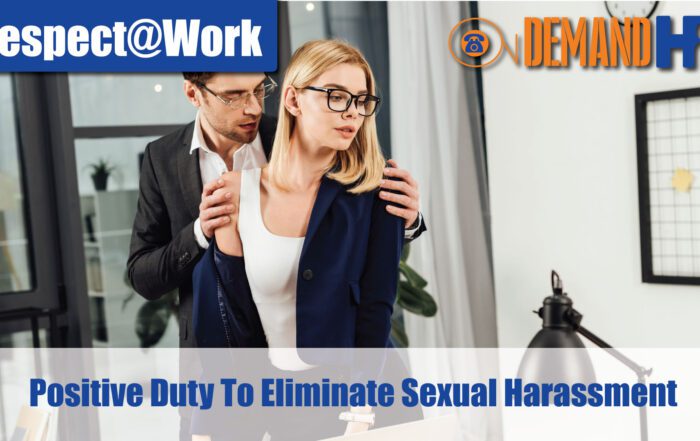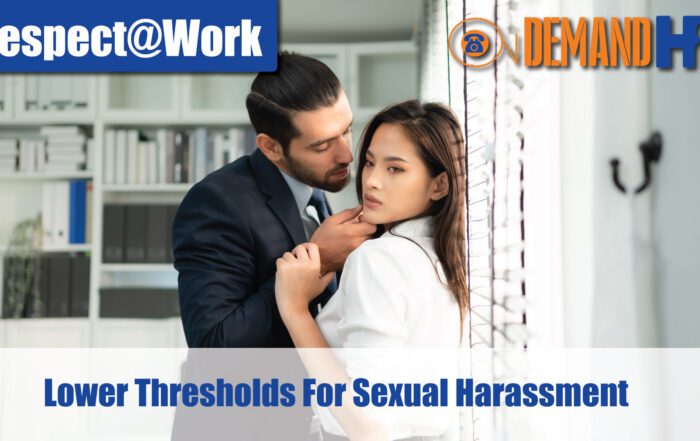Managing Masks & Vaccines In The Workplace
We will be discuss how to manage masks and vaccines in the workplace. Can we direct employees to wear masks and get vaccinated? Is so, should we? What litigation risks do businesses need to consider?
Please see below for a full transcript of the video
Share the HR or workplace relations challenge facing your business and one of our experienced consultants will be in touch within 24 hours with a strategic action plan or discover the best strategy yourself by accessing out free online training library.
Transcript
0:11
Good morning, everyone. Happy New Year to all of our clients, associate members and guests. My name is Clint Indrele, Managing Director of On Demand HR. Every Friday now at 10am. We’re going to be presenting a different HR and IR topic. As you would have seen last year, we presented I think 14 topics leading up into Christmas. And we hope that we provided you some useful insights into various different HR and Workplace Relations issues for you to consider in your businesses or to consider with your clients when having discussions with them. Let us know of any future topics of interest that you would like, we’re always looking for direction on what it is that clients and businesses want, what they want us to talk about, and happy to look at those for future segments. If you’re watching live today, or anytime after this video, please, if you’ve got any questions, feel free to put them in the comments box. And we’ll be happy to take them either on the fly live, or happy to respond to you after the session.
So the whole purpose of HR Fridays, as we’ve said numerous times last year, it’s trying to provide businesses, other organizations and professional advisors and our associate members with information which is a true lay of the land, we’re trying to stop the noise and the scare tactics you might hear from other advisors who are just trying to sell you a product or service. So that’s the purpose of this segment. We have been in the Fair Work Commission many times we’ve done many workplace investigations, we’ve dealt with the Fair Work Ombudsman many times. So this allows us to provide real Iperspective, not just theory. if you want to see more about what we do and what we offer www.ondemandhr.com.au
Today’s topic is going to be looking at masks and vaccinations in the workplace. So very topical stuff at the moment, many businesses thinking about this sort of thing, how they’re going to deal with this in the time ahead. Obviously, this is a very early stage to be talking about this, we thought best to get ahead of it before businesses and organizations that we are dealing with make mistakes on these particular things. So I’ve also got Andrew Koleda on standby today who might actually assist us in the stream if necessary. He’s been working with me a lot to get together today’s information. So once again, if you’ve got any comments, feel free to talk to us during the session. Let’s get cracking. And let’s get into the material today.
So first and foremost, can I direct an employee to wear a mask? So I think there’s a couple of things here on this particular one, we’ve got, first of all, a definition from Safe Work Australia on this. And what it says is that you can direct a worker to wear a face mask, if you in consultation with those workers decided it’ necessary to minimize the risk of exposure to the COVID-19 virus. Interesting kind of definition there. It’s sort of it’s a little bit of a sort of a buck each way, it talks about you can direct in consultation, if it’s necessary to minimize the risk of exposure, well, you can make that argument for any industry really. So, you know, regardless of whether or not you’re one of the key industries that potentially has higher at risk components, because of the nature of the work being carried out, I think there is an argument for anyone to wear a face mask under that kind of definition. So that is certainly something that will be interesting to see, and whether that evolves over time. So we think there is an obligation to provide three things. So first of all, provide adequate training on how to wear, remove and dispose of masks, good hand hygiene, washing your hands, etc. and providing appropriate facilities for hand washing and disposal of used masks in a closed bin. So I guess our feeling on this, our early feeling on this is that we think that masks would be appropriate in situations where obviously you are directed by relevant authorities to wear such masks. So obviously at the moment in New South Wales, there are a number of different settings where the general public are required to wear masks. And we think that that would correlate with obviously employees in those particular types of industries or environments that should be wearing masks in that situation. So there’s an important point to note though, and that is that wearing a mask doesn’t change any potential liability or presumption for contracting COVID-19 at work, and I’ll explain what that is in a moment and go through some of the industries where that is the case.
So let’s talk about vaccines now. So in terms of can you require employees to vaccinate? Well, at this particular point, as you can imagine, there’s been no precedent to date for COVID-19 vaccines being required for employees, this hasn’t been tested in the courts yet or in the commission. Some of the legal experts out there are saying that it may be a fair and reasonable directive, as some are even going further to say that there might be a positive obligation to protect other employees and customers. The only case law that we have to rely on and this is quite sort of minimal. There was a case that goes back to actually 2020. It talks about an employee who refused a flu vaccination in a childcare setting, and was dismissed from that particular childcare facility. Now, unfortunately, the case was dismissed on procedural grounds, simply that it was out of time. So the Fair Work Commission has a timeframe, you must lodge an application of 21 days, and that application wasn’t launched within that time. So that is a real shame, because it would have given us I think, some decent insight into, you know, how the Commission, you know, may interpret these things and give us some guidance on COVID-19 vaccinations. And one thing that was interesting, though, is that the Deputy President, despite dismissing the matter on procedural grounds, the Deputy President indicated that both sides of the argument were at least equally arguable. So what that saying to me is that well, the employees argument that they didn’t want to take the vaccine, the flu vaccination, in this particular case, wasn’t frivolous, and that there was an argument to be put to the commission. So that’s very interesting. So that that’s saying that at the very least, that if someone refuses a COVID-19 vaccine, it’s likely not to be a black and white situation, and that there’s going to be a case to be had in the commission, or in an alternative jurisdiction, of course. So the early signs as well, are that medical reasons and allergies will be factors in determining whether or not telling an employee to take a vaccine is a valid and reasonable directive. So it’s going to be interesting to see how that plays out. Another gray area is going to be whether or not there are political reasons for I’m sorry, religious reasons for refusal. Because there may be some religions that may take the view that a vaccination, depending upon what’s in the vaccination could be inconsistent with their religious beliefs. I’ve also added in here political beliefs or reasons, then some people might sort of, you know, think, what do you mean political beliefs, but I think there is a growing number of people who see this as a political issue. That see COVID-19 restrictions, vaccine, how the virus came about as being a political issue, and that their opposition to taking the vaccine may very well be a political one, not necessarily a religious one. So be interesting to see how that plays out. Obviously, we think the religious argument would be a better argument for not taking the vaccine than a political one. And I’d be very interested to see how that plays out the first time that that is, that is tested. So again, should be very interesting to see how this all happens.
Let’s move on to, this is a very interesting slide. And this is about the presumption of contracting COVID-19 at work for the following industries. And this was information that we obtained from the workers compensation independent review office, WIRO in New South Wales. So what this is basically saying is that if you contract COVID-19, and if you work in any one of these industries, the presumption is that you have contracted COVID-19 at work. So the assumption is that if you’ve got COVID-19 you work in these occupations that you’ve got it at work, for the purposes of liability, and so on and so forth. So at the moment, the list includes the retail industry, healthcare sector, police and emergency services, firefighters, ambulance officers, educational institutions, the cleaning industry, the construction industry, restaurants, clubs, hotels, disability and aged care, refuges half way houses and shelters, passenger transport services, courts and tribunals, correction detention centers, places of public entertainment, or instruction. So those industries, if you work in those industries, you contract COVID-19. The presumption is that you contracted there. There is something that balances off against this, though and at this point with the numbers are, frankly, being really, really low across the country. I mean, you know, I’ve got to say that the restriction that we have across the country at the moment imposed by the state premiers are very, very questionable when you look at what is going on in terms of the numbers. I mean, we are talking single digit numbers, you know, across the states, for daily new cases that are locally acquired, and really when you consider that, you know, foreign ones will always be quarantined, there is very, very small exposure at the moment for COVID-19 to be spread within the community. So why I tell that story is that, at the moment, it’s not going to be very difficult to do contract tracing for COVID-19 cases. I mean, obviously, when we had some significantly higher numbers in Victoria, I think we got up to 700 in a day, you know, back in 2020, at some point, might be more difficult to determine the exact source of the virus being contracted. But at the moment with such low case, numbers, even with the presumption that you can contract COVID-19 in those environments, it would not be difficult to have contact tracing, which could actually prove otherwise. So if you, for example, worked in the healthcare industry, but you know, you contracted COVID-19, at a restaurant, on that night, it wouldn’t be very difficult to trace back to that particular restaurant, if that was, in fact, the place in which COVID-19 was contracted. So the only other thing I would say on this is that there may be subsequent claims that may come from contracting COVID-19, such as mental health. And also there is some situations we’ve seen across the world where there’s been a lasting effect of the COVID-19 virus on a particular person with ongoing respiratory problems and things like that. So you would expect that in most situations, COVID-19 would be contracted, and there’s a recovery certainly in 98/99% of cases, but in others then may not necessarily be and there may also be liability for other things such as mental health problems. So that that has been on the presumption of contracting COVID-19 at work.
So I guess, look, I wanted to take this opportunity to kind of summarize our thoughts on this. And so first of all, the efficacy of the vaccination is still unknown. Will there be potential future liabilities or unknown side effects? I mean, this is a real risk in all of this. I mean, we’ve got some businesses that are chomping at the bit to mandate vaccinations. And I think that’s, that should be taken with great caution. Because certainly, what we’re seeing at the moment is that certainly the AstraZeneca virus or the vaccine, should I say that they’re talking about Australia, talking about 62% effectiveness rate, they’re saying that might not be enough for herd immunity, and things like that. So, again, whether the government will turn its mind with different vaccine or not, it’s kind of irrelevant, really, because it comes down to will there be side effects from the vaccine, ultimately. Now, again, even if you do vaccinate your employees, or even if you are required to vaccinate your employees, because of what industry you are in, that’s not going to change the presumption of liability for workers compensation. And if those workers still contract COVID-19 in the workplace, or or they contract it and the source is unknown, the presumption of liability will still be there. Should the federal government not mandate the vaccine for your industry, I guess our early view is that you are likely taking on additional risk in that situation. So I would, I would be cautious again, with clients to not overreach on this, that if the government says that you need to vaccinate in your industry, well your hands are probably going to be tied, and I would, I’d be reluctant to go any further than that. So there’s no need to take an individual stance on these particular matters as an employer beyond what the government is directing. So again, back on vaccinations, there could be an argument of more downside than upside, the potential risk of unknown side effects versus the risks of not doing so. And in Australia, at the moment, we are fortunate the case numbers are so low that you know you’re almost a better chance of winning a lotto ticket than you are contracting COVID-19 right now in Australia. So again, something for employers to consider there. Obviously, the damage to industry has been, you know, considerable so and then again, this is all going to tie into what’s going to happen with JobKeeper wil JobKeepr be continued again? Or will the state premiers be finally forced to actually open up this states for business? We’re going to see that in the coming months.
Look, our position at this particular point for clients is that we’ll only be advising clients to require masks and vaccinations in situations where it’s aligned with directives from the state and federal governments. And I say that requiring masks and vaccines is because, again, I don’t know what your personal observations of wearing masks are, but certainly from my perspective, I often feel it’s far more difficult to breathe walking around with a mask on than it is without one. So, you know, again, if your industry requires it, sure, but if it doesn’t, well, you know, there’s no need to necessarily go anything beyond what what the government is requiring for the specific industries that we’ve outlined. So that is, that is where things are up to. So that is basically it for today’s presentation on masks and vaccinations in the workplace. I hope you got something out of that today. And I hope that gave you some real guidance on how you should be considering these issues. I’ll just leave the line open for another 30 seconds to a minute for individuals to ask any questions or make any comments about this particular issue before we close. But yeah, look, it’s going to be certainly something that’s going to be very interesting in in 2021. How far will the government’s go? How many industries will they require this from? We are seeing a growing level of requirement from government it’s sort of seems very odd that in New South Wales, for example, with the case numbers being much lower than they even were in 2020. Why now in terms of requiring masks in shopping centers and various other locations when that was not the case in 2020. So there’s that factor. And that could be a sign of things to come from the governments that we may see, not only in New South Wales, but in other states. So something there about that.
Steve, thanks for watching today’s today’s coverage. We’d love to chat with you about this, these topics and and your thoughts on those as well. Thanks for joining in. And thanks for everyone else who joined us today to talk about these things. Really appreciate your coverage and you’re coming to listen to these HR Fridays. We’ll continue to have thought provoking topics in the coming weeks. But for now, look, it’s Clint Indrele Managing Director of On Demand HR. Goodbye and enjoy your weekend. Thank you again.





